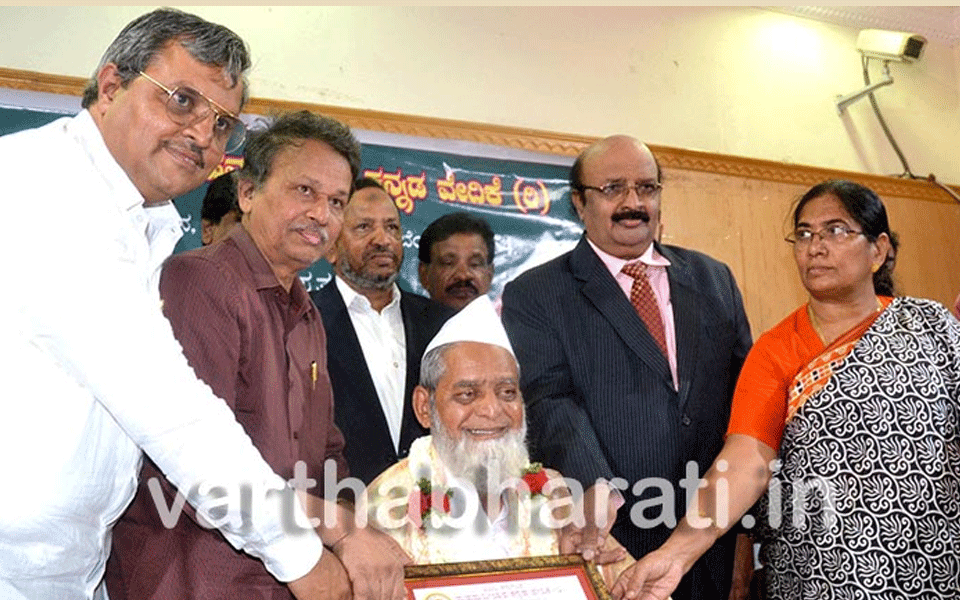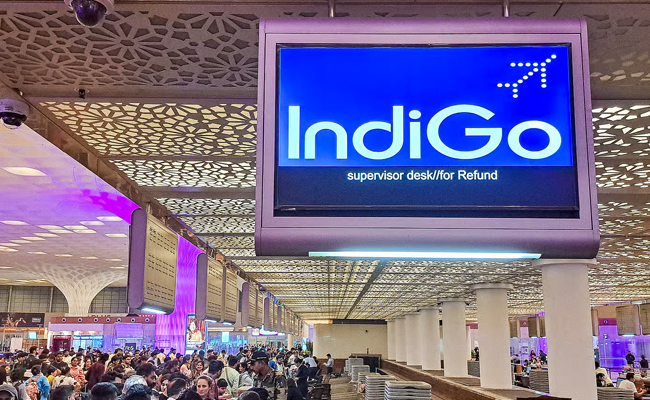Bengaluru, July 02: Noted senior writer Prof Baraguru Ramachandrappa said that those who use the name of Swami Vivekananda should understand his words “Brain of Vedanta and body of Islam”.
Speaking at a programme organized to felicitate Padmashri awardee Ibrahim Sutra, by the Akhila Karnataka Mohemmadans Kannada Vedike at Press Club here on Monday, Prof Baraguru said that “today we have two options like united India and communal India. At this time, we should understand the broad meaning of brain of Vedanta and body of Islam of Swami Vivekananda should come together”, he said.
It was unfortunate that India today was changing negatively. Pushing the equality backward, caste, religion and communalism were coming forward. By using the positive aspects of the concepts like religion and God, the disease of caste and religion should be removed. The literature of Sufi saints would also give effective treatment to eradicate caste and communal diseases, he said.
In recent days, the devotion was made capital. One should see the God within himself and the God should not be brought on to the streets which is not devotion or spirituality. Communalism has replaced the humanity. “We are in a panic situation and we should ask ourselves that are we growing weapons in the land where crops were being grown”, he asked.
At the 500th anniversary of St. Kabeer, some national leaders have misused his name for political gains which is a tragedy. In recent years, the number of swamijis for each caste was increasing. Caste politics, religious politics and party politics have come together to exploit the common people. At this moment, there was a need to establish communal harmony, for which, the number of people like Ibrahim Sutara should be increased, he said.
After being felicitated, Ibrahim Sutara said that “one should understand his religion and philosophy. Besides reading our religious text, holy texts of other religions should also be read. Later, the religion of others should be respected. This is real harmony. But one should have broad mentality to achieve it”, he said.
“All religious scripts have mentioned the God. If all texts were read honestly and precisely, we can understand that everything is same. But nowadays, without understanding any religion, efforts are on to disturb the communal harmony between religions”, he said.
“Going in search of the God is not a religion. We should search the God within ourselves. We should understand that body is temple and life is God”, he said.
Retired IPS officer U Nissar Ahmed, former vice chancellor Prof KR Iqbal Ahmed, writer Dr K Sharifa and vedike president Samiullah Khan were present.
Let the Truth be known. If you read VB and like VB, please be a VB Supporter and Help us deliver the Truth to one and all.
Bengaluru (PTI): The Karnataka government has issued directions to municipal corporations across the state to regulate and prohibit feeding pigeons in public places, citing serious public health concerns.
Deputy Secretary to Government V Lakshmikanth has written to the Urban Development Department requesting it to issue directions to the Greater Bengaluru Authority (GBA) and all municipal corporations to take immediate steps to implement the measures.
In an official note dated December 16 issued by the Health and Family Welfare Department and released to the media on Wednesday, the department said uncontrolled feeding of pigeons in public places has resulted in large congregations of birds, excessive droppings and serious health concerns, particularly respiratory illnesses linked to prolonged exposure to pigeon droppings and feathers such as hypersensitivity pneumonitis and other lung diseases.
ALSO READ: Chinese GPS tracker found on seagull near Karwar Coast
"The commissioner, the Greater Bengaluru Authority and the Commissioners and chief officers of other municipal corporations shall take necessary action to mitigate the causes of dangerous disease spread by pigeon and enforce specified guidelines in their respective jurisdiction," the note said.
According to the department, these include a prohibition on feeding pigeons or causing pigeons to be fed in areas where it may cause nuisance or pose a health hazard to the public. Pigeon feeding shall be permitted only in designated areas in a controlled manner, subject to certain conditions.
"The designated areas may be selected in consultation with stakeholders. The responsibility for upkeep of the designated areas and compliance to the directions shall be taken up by some charitable organisation or an NGO. The feeding in designated areas shall be permitted only for some limited hours in the day," it said.
The note further stated that authorised officers of local authorities shall issue on-the-spot warnings and may impose fines for violation of the order, or lodge complaints to prosecute offenders under Sections 271 (Negligent act likely to spread infection of disease dangerous to life) and 272 (Malignant act likely to spread infection of disease dangerous to life) of the Bharatiya Nyaya Sanhita.
It also directed local authorities to conduct public awareness campaigns, including the display of signboards, banners and digital messages, explaining the health hazards associated with pigeon droppings and feathers, the content of the regulatory directions and penalties for violations, and alternative humane methods of bird conservation that do not endanger public health.





